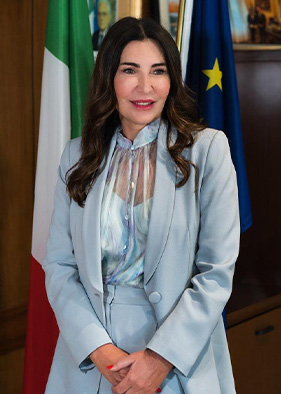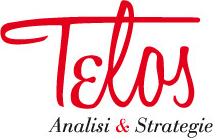September 2025, Year XVII, no. 9
Alessandra Bruni
Guardian of the Skies
“Every day hundreds of thousands of people in Italy choose air transport because it’s safe. However, flying isn’t inherently safe, it’s the result of the constant commitment of service providers like ENAV.”
Telos: You’ve been Chair of the Board of Directors of ENAV for just over two years. Why are ENAV’s activities important for all of us?
Alessandra Bruni: ENAV handles civil air traffic in Italy and ensures its uninterrupted operation according to the highest standards of safety and efficiency. In a world increasingly shaped by global interconnectivity and by the broad mobility of people and goods, the safety and efficiency of air traffic are fundamental pillars that protect individuals and society. Every day hundreds of thousands of people in Italy choose air transport because it’s safe. However, flying isn’t inherently safe, it’s the result of the constant commitment of service providers like ENAV, which cultivates a company culture focussed on safety that pervades the attitudes of individuals, the group and its organisation. So, our mission is to always ensure the safety of millions of passengers who fly the Italian skies, thereby contributing to the efficient, innovative, sustainable growth of national and European air transport.
Technological innovation is of central importance because of ENAV’s institutional duties… but there is far more to it than that. Can you elaborate?
When it provides air navigation services, ENAV relies not only on its highly qualified operational staff, but also on its excellent technological equipment and infrastructure, which together are why the company is always among the five top players in the European sector, not only because of its operational performance, but also because of its ability to innovate.
I’ll give you an example: ENAV is implementing digital control towers, which are already active in Brindisi and Perugia. A revolution in air traffic control that allows controllers to manage operations from a remote tower that may be positioned even kilometres away from the airport involved.
Many of the technological solutions ENAV has pioneered have had a very positive impact not only in terms of safety and efficiency but also in terms of sustainability, for example, by consistently lowering CO2 emissions from air traffic.
However, our attention to innovation has really taken us a long way, even beyond our core business, which is linked to ‘traditional’ air traffic. Currently, one area the Group is carefully watching is the world of low-altitude airspace through unpiloted aircraft, in other words, drones!
The potential of this sector is huge in terms of the development of sustainable mobility and new business opportunities (and the creation of new jobs). Just think of the transport of people, goods and biomedical material, or even of the inspection and mapping of areas and infrastructure or agricultural support. The ENAV Group is on the cutting edge and was the first in Europe -and currently the only one in Italy- to be certified as a common information service provider (CISP) for all those working in the area of drone traffic.
What is ENVA’s next challenge?
The ENAV Group’s 2025-2029 Industrial Plan features a series of important challenges, especially regarding the strengthening of its core business connected to conventional air traffic control. It will be making significant new technological and infrastructural investments in order to always maintain the highest level of safety and efficiency.
At the same time, it will also be continuing its development of activities connected to the world of drones and their great potential, which will create important opportunities not only for the company but for the entire system-country.
In general, the ENAV Group intends to strengthen its presence even in unregulated sectors. We are already a very authoritative player among service providers connected to air navigation control and are active in numerous countries on all five continents. However, we believe that the Group’s presence on international markets has significant margins for growth and the Industrial Plan focusses on this in particular.
The various, challenging projects and initiatives we are pursuing never stray from the goal of sustainability. We have recently approved a multiyear sustainability plan that is fully integrated with our industrial plan. We will be moving forward in line with that approach, which has already secured ENAV’s place as the “Best-in-class” in terms of sustainability in this sector, with important certifications and public recognition.
One of the projects closest to your heart is the ENAV Foundation. Why?
The ENAV Foundation was established relatively recently. It was set up in 2023 and became operational in 2024 when I became Chair of the Board of Directors. In just over a year, we have carried out various social, humanitarian and cultural initiatives
Last summer we restored and re-activated a school in the outskirts of Malindi, allowing around 250 school children between the ages of four and sixteen (half of whom are girls) to go back to school. Also in Kenya, we are working on new projects in healthcare with the support of leading figures in Italian academic institutions and healthcare.
We are also focussing on the needs of the most vulnerable in our own country. For example, we have started collaborating on a laundry service for the homeless and people in difficulty and on offering support to cancer patients.
We are trying to promote culture: not culture for culture’s sake but at the service of people. For example, the Foundation has launched its first podcast project “La Luce in Fondo” dedicated to the existential themes of our times as well as the format “Fly High Talks,” which is an opportunity for high-profile personalities to discuss the big civil and social issues. We also offered our support to an extraordinary cultural and spiritual event this last year: the Jubilee.
When it comes to the area of ESG (environmental, social and governance) in the third sector, the ENAV Foundation is also active on social media. However, I think it is also important to stress how it pays special attention to others in each relevant aspect of existence, from human beings’ most urgent material needs to their cultural and spiritual “nourishment”.
The concept of “flight” -which characterises the business of the ENAV Group- is especially symbolic and evocative when expressed in terms of attention to human beings. I think this embodies my main response to your question regarding my special fondness for the Foundation’s projects.
Marco Sonsini
Editorial
When we talk about air transport, we think about engineering, institutions and public responsibility. However, it is far more than just taking off from a runway. By now, for passengers, air travel may feel almost natural, and this is thanks to a complex system of people and technologies that quietly work to transform risk into reliability. ENAV is one of these quiet presences. Actually, it is the invisible cornerstone of this system according our September guest for PRIMOPIANOSCALAc, Alessandra Bruni, Chair of the Board of Directors for the Group. Under her leadership, ENAV has approved a complex industrial plan that also includes investments in the development of new platforms to manage air space.
How does one govern a space that is becoming more and more complex, populated not only by traditional aircraft but also by drones and satellite systems? The governance of the skies requires shared standards, protocols for co-existence and common technical languages that go beyond borders.
Technology can boost efficiency, but alone it cannot also serve as an ethical compass. Modern control systems and the introduction, for example, of digital towers and services for low-altitude air traffic, must go hand in had with cultural responsibility combining safety, accessibility and civic sense. And this is the philosophy motivating Chairwoman Bruni.
One recent example confirms the strategic role an airspace manager can play during international crises. Last July, during the Ukraine Recovery Conference, ENAV, along with Leonardo and the Ukrainian UkSATSE, drafted a Memorandum of Cooperation to launch the UARRP (Ukraine Air Traffic Management Restoration and Recovery Plan). ENAV helped to restore and strengthen Ukrainian civil air navigation infrastructure with its operational know-how and consultancy services, including the donation of five primary en-route radars.
Through ENAV, Italy brings skills to the table that translate not only into technical efficiency but also provide a cultural and diplomatic contribution.
And this is where we can see the link between the Group and the ENAV Foundation. While the company oversees technical safety in the skies, the Foundation is an expression of its symbolic and human value. Its educational projects in Kenya, its initiatives for the most vulnerable in Italy, its “Fly High Talks” offering space for civil reflection: all of it follows the same trajectory. Managing the skies with its engineering precision and caring for communities and their vulnerabilities become two aspects of the same responsibility, making the Foundation not a separate piece but rather a natural extension of ENAV’s industrial mission.
In this way, the sky, forever a symbol of freedom and aspiration, also becomes a political and civil space: a place where technology and culture dialogue to build co-existence. This is perhaps the deepest legacy of Alessandra Bruni’s vision: showing that we can fly high not only with the wings of science but also with those of collective responsibility.
Red, black and white: the traditional colors of Telos A&S are back in the 2025 cover graphics of PRIMOPIANOSCALAc. We reveal our guest’s identity by showing half of their face on one side and a quote from the interview on the other. Their name is written in Abril Fatface, a classy font inspired by 19th-century European advertising posters.
Mariella Palazzolo

Alessandra Bruni has been the Chair of the Board of Directors of ENAV since 28 April 2023 and the Chair of the ENAV-E.T.S. Foundation since 14 November 2023. For over a year, she served as the Chair of the Group's Internal Sustainability Committee. A state attorney since 1990, Bruni has also been a legal advisor for major public and publicly controlled entities since 2003, including SACE S.p.A. (since 2003), Simest S.p.A. – Cassa Depositi e Prestiti Group (since 2017) and ICE (since 2021), and has special expertise in the management of public funds and internationalisation.
Over the years, she has held teaching positions at various public and private universities. For example, she taught at the University of Rome “La Sapienza” from 2003 to 2013 in the School of Specialization for the Legal Professions. Her many publications include a 2011 monograph, La difesa dello Stato nel processo (Defending the State in Trials) (published by Utet Giuridica).
Alessandra is Chair of the Federal Appeals Court for two national sports federations, so it comes as no surprise that she is passionate about high-level sports. She used to compete but then also began to study sports from a legal perspective, applying her experience to sports law. Alessandra has two daughters: one a professional athlete and the other in fashion. Bruni’s passions are good food and good books, especially books about philosophy and psychology.
Marco Sonsini







SocialTelos